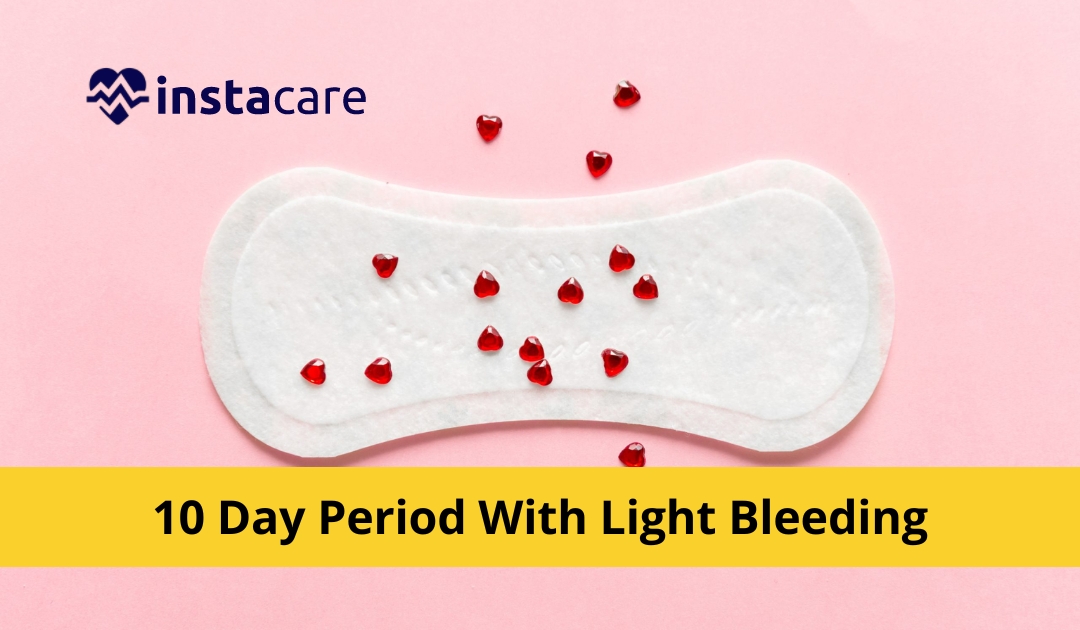If you're experiencing a lengthy 10 day period with light bleeding, then it can be quite concerning. From wondering what is happening to your body to figuring out if this is truly something that needs medical attention, there are many questions that enter the mind of someone who has been dealing with this situation. In today's blog post, we'll break down some potential causes and discuss when you should seek out professional help from a doctor.
Causes of a light period
1- Implantation bleeding in Pregnancy
Understanding implantation bleeding in pregnancy can be helpful for expecting mothers. Implantation occurs 10-14 days after conception when the fertilized egg implants itself into the uterus. The result is light bleeding for a period lasting 10 days to two weeks, which often resembles a very light version of a typical period. This bleeding is usually mild and doesn't involve cramping or pain, but if you experience either of these symptoms it’s best to contact your doctor.
Such bleeding may be accompanied with other signs of early pregnancy such as fatigue and breast tenderness. While implantation bleeding can occur in the first stages of pregnancy, it isn't necessarily a cause for worry. It’s an important step that lets you know your body is on track toward having a successful pregnancy!
2- Abnormal Uterine Bleeding
Abnormal Uterine Bleeding is an issue that many people experience, yet remain unaware of its implications or what it might mean for their health. This health condition typically manifests itself in 10-day periods with light bleeding between cycles. While this may be a normal occurrence for some women, frequently such bleeding can signal an underlying medical condition of the reproductive system and should be discussed with a trusted healthcare provider.
If left untreated Abnormal Uterine Bleeding can lead to other more serious medical conditions, so if any symptoms associated with this issue are experienced, it is important to bring them to a healthcare provider's attention as soon as possible.
View More: How to Reduce Cramping During Periods without Medication
3- Thyroid Disorders
Thyroid disorders are an increasingly common health issue, affecting people of all ages. The most common forms are hypothyroidism and hyperthyroidism. Although they can cause diverse symptoms, they typically involve 10 day periods of light bleeding, fatigue, difficulties sleeping and difficulty in concentrating.
Proper diagnosis is key to effectively manage the condition, which can otherwise lead to more serious issues such as high cholesterol levels and heart diseases. If you have 10 day periods of light bleeding with other seemingly unrelated symptoms, it is important to get your thyroid checked as soon as possible to start proper treatment.
4- Ovulation
Ovulation is a 10-day period when eggs in the ovaries are released and travel down the fallopian tubes. It typically occurs 12-16 days before your period and it is key to conception. During this 10-day window, you may experience light bleeding or spotting as a sign that you are ovulating. While this varies person to person, most women experience subtle physical symptoms around the time of ovulation including breast tenderness, abdominal fullness, and a heightened sense of smell or taste.
It's important to become familiar with your own body because these signs along with other factors such as tracking your basal body temperature helps give an indication when you're ovulating. Understanding how your cycle works helps inform timing for trying to conceive or preventing pregnancy.
5- Sexually transmitted infections (or STIs)
Sexually transmitted infections (STIs) are a very real danger that should not be taken lightly. They can have a range of symptoms, which can vary depending on the STI and severity, but they may include itching, burning while urinating, 10 day period light bleeding and odd colored or smelly discharge from the vagina or penis.
Even when there are no outward signs and symptoms, STIs can still be present. That is why it is important to practice safe sex with proper protection if you are engaging in sexual activities and to get tested regularly for any possible infections.
6- Uterine Fibroids
Uterine fibroids refer to non-cancerous growths found in the muscular wall of the uterus that can range from small to large size. 10 day period light bleeding may be an indication of uterine fibroids, although the exact cause is unknown. Symptoms may include pelvic pressure and pain, increased menstrual flow or spotting between periods. Diagnosis typically includes a pelvic exam or imaging tests such as 5-member ultrasonography or MRI.
Treatment options depend on the severity of the symptoms and other factors like age, but commonly include medications, hormonal therapy and even surgery in some cases. It's important to speak with a doctor if you are experiencing 10 day period light bleeding to determine whether uterine fibroids might be causing your symptoms.
View More: Brown Spotting Instead Of Period
7- Body weight changes
If you've ever noticed that your weight fluctuates over 10 day periods, light bleeding may be to blame. Making a few simple lifestyle changes can help you offset the influence of hormonal fluctuations on your body weight every 10 days. This can help keep your metabolism and energy levels balanced, and make it easier to stay at a healthy weight.
Eating portion-controlled meals throughout the 10 day period can help balance hormones and ensure you're getting adequate nutrition. Also consider getting regular exercise and enough rest each night for optimal health. With these changes in place, you should find it easier to maintain your ideal body weight throughout the 10 day period when you experience light bleeding.
When should you see a doctor?
It is important to visit a doctor or healthcare provider if you experience light bleeding for 10 days or more, even if there are no other symptoms. If this is happening, it could be caused by a number of factors such as hormonal imbalances, uterine formation problems, growths in the uterus or pelvic region, or infection. In any case, you should see a doctor as soon as possible to determine the cause and get appropriate treatment. Additionally, it can be helpful to keep track and record any details of the light bleeding such as start date, color of blood, degree of pain and amount of blood present that you can share with your doctor upon examination.
Conclusion
If you have a 10 day period with light bleeding, it could be caused by any number of things. It's important to monitor your symptoms and see a doctor if the bleeding is heavy or accompanied by other worrisome symptoms. In most cases, though, a 10 day period with light bleeding is nothing to worry about.
Please book an appointment with the best Gynecologist in Lahore, Karachi, Islamabad, and all major cities of Pakistan through InstaCare, or call our helpline at 03171777509 to find the verified doctor for your disease.
Source: https://instacare.pk/blog/why-do-i-have-a-10-day-period-with-light-bleeding












